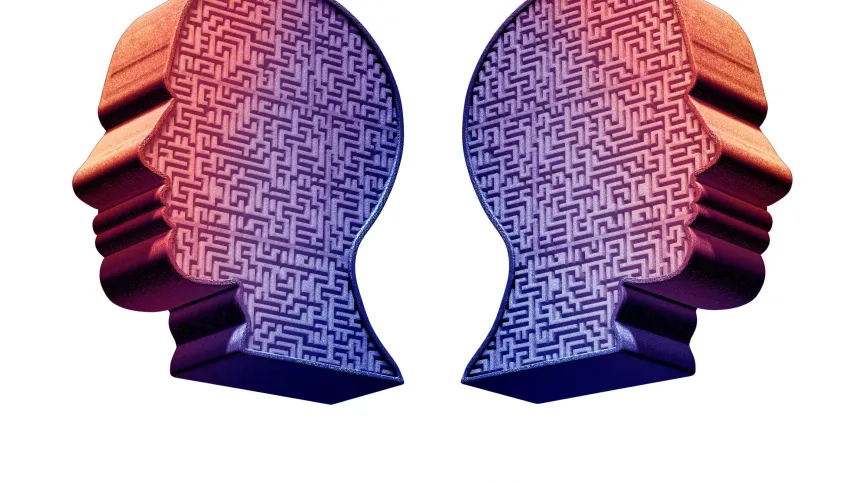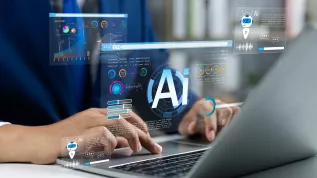
The entry of artificial intelligence is a greater shock for politics than the rise of the USSR, says Dr. Kamil Kulesza, founder of Centre for Industrial Applications of Mathematics and Systems Engineering established within the structures of the Polish Academy of Sciences. In his opinion, the revolution caused by AI is accelerating and covers more and more areas of our lives.
PAP: More than a year ago, we talked about the phenomenon of ChatGPT that the whole world was excited about. Experts theorized how artificial intelligence (AI) would develop. In your opinion, its development could be faster than most people thought. Which would bring us significantly closer to Singularity, the event after which our civilization would no longer be the same.
Kamil Kulesza: As I said then, ChatGPT was just a public manifestation of what business had been working on for years. People realised that some things were possible. Today, about 1.5 years after it started, I believe that many things happened faster than we thought they would. Maybe they are not so spectacular anymore, but they are important from the point of view of everyday life, work and functioning in general. The use of AI has become widespread - today even McDonald's uses it to optimise the company's operations. In Belgium, AI is used to design very good beer. In general, the business sector quickly realised that it had to adapt. Even entrepreneurs who are far from high-tech, people who started their businesses 30 years ago, see this. And they pay us very good money, for example, for consultations and workshops for management boards. However, representatives of public administration and politicians do not seem to understand this - at best they make general declarations. We will be able to show a reliable assessment of politicians' truthfulness on live screens, e.g. during debates. And this is completely independent of the local media.
PAP: I understand, but let me ask again: what new AI solutions have appeared over the past dozen or so months?
K.K.: There is, for example, a system called Whisper, which almost flawlessly digitises speech in any language into a written text. We had text transcription programs before, but the difference between them and Whisper is similar to the difference between riding a horse and driving a modern car. This is important for users, but it gives even more food for thought to specialists.
It also seemed that the AI needed to be 'fed' with more and more text, photos, etc. The set of such data is finite and will run out. Currently, demand is growing much more slowly, also because algorithms are better.
PAP: But these data will still run out someday.
K.K.: I guess so. Some people tried to solve the problem of 'stock depletion' by generating texts and images using AI itself and then feeding these products to models. It turned out that the quality of the models degenerated because of this - which was clearly visible in the example of images. Japanese researchers from Kyoto University did a study in which they 'fed' AI with photos of African elephants and then asked it to generate images of elephants. After a few iterations, the AI-generated elephants began to degenerate, for example, they had two trunks, four ears, etc.
PAP: Could it be compared to inbreeding?
K.K.: Inbreeding is actually the term used in the industry. Interestingly, this was predicted in the 1990s by Konrad T. Lewandowski in his story El Nino 2035. The remedy was to add input from people. So there is a chance that we will be needed for something.
PAP: Are there any new solutions in the AI industry?
K.K.: Yes, this is the entire area of work automation. A good example is the recently published system called Devin, tested on the large international website UpWork. Companies post jobs there for programmers or their entire teams, often very highly qualified ones. Currently, Devin is able to complete up to 20 percent of these orders independently, from beginning to end, and a year ago this was not possible. It may soon turn out that there will be less and less such work for people.
The same thing is happening in the very demanding GameDev industry. Creating a large game is not just about programming or creating graphics. In fact, it is a project similar to the production of a film, it involves writing scripts, participation of actors, etc. Large productions, such as The Witcher by CD Projekt, take several years, cost hundreds of millions and employ a team of people. It will soon be cheaper and faster to outsource at least some of this to AI.
The British have shown that 84 percent of standard tasks in public administration can already be performed by AI - without humans. All GAFAM companies (Alphabet, formerly Google; Amazon; Meta Platforms, formerly Facebook; Apple' Microsoft - ed. PAP) and IBM use AI automation. In addition, artificial intelligence can also take over jobs that need to be performed physically in the real world. There is a concept of 'robotic arm', i.e. the ability of AI to physically interact. We are making great progress here, just to mention Boston Dynamics, a company from MIT that develops robots, for example, mules for the US Army. They have built "Atlas" - a robot that looks a bit like the Terminator. Three years ago, it was able to do a backflip, a difficult task for humans. The result: every Atlas can do this if it has the appropriate programming. One of Atlas's latest achievements is parkour at an excellent level. In the past, these robots were connected to long power and data transmission cables. Now they have batteries and better and better processors, which are constantly being improved.
PAP: What will happen when most people lose their jobs because AI does everything?
K.K.: This is a big and open topic. There will definitely be great social changes. As for salaries, I participate in the construction of a model that has shown that with the use of AI, even in the current economic system, it is possible for every person, including retirees and children, to have the same income as today. Of course, it remains an open question whether the allocation of funds will remain unchanged. If there is consent from those who finance our research, we plan to publish the results. Some will say that these are leftist, even communist pipe dreams, but I would like to emphasize that the result was obtained within the framework of the market economy paradigm.
PAP: So far, when people dreamed about artificial intelligence, they often imagined it in the form of large computers or humanoid robots, such as Atlas. Meanwhile, today it may take a different form.
K.K.: Yes, a 'robotic arm' can be of any shape and size, including, for example, a huge number of intelligent nanomachines. They will reach where no humanoid, e.g. a plumber or a doctor, can reach.
PAP: How can AI influence education and science?
K.K.: Let's start with the fact that the language barrier has basically ceased to exits. Algorithms translate from one language to another in real time - in writing, voice, video - you name it, all you need is a smartphone. How many people will want to learn English or another foreign language? A few percent of enthusiasts, because for most people the motivation to learn a language is purely commercial. Today we need to consider what to do with language teachers.
Another thing - due to the ambitions of local communities, more and more universities are being established; I will not comment on their quality. But if the language barrier disappears and a young person has a choice: listening to lectures from Harvard or Cambridge or 'provincial fools', I am afraid that the choice will not be very patriotic. It will be similar at the secondary level, there already are educational projects in the world, such as Khan Academy, which teaches for free, in Poland we have the School in the Cloud. This way we can offer high-level education to anyone, we just need to somehow solve the issue of socialization.
Moreover, the cult of paper is dying - it is already visible in AI companies that check what you can really do. And often people without a college degree earn a million dollars a year, while many 'eminent' professors complain about budget funding and, at best, live on grants. At the end of June 2023 I was invited to a large international industrial maths conference in Wrocław. My lecture concerned innovative research projects carried out with company funds and how AI is changing the way mathematicians work. On the same day, Harvard announced that from the new semester (fall 2023), the basic computer science course will be taught by artificial intelligence in the form of an interactive bot with which each student can work individually, at their own pace. I said it at the end and watched the reactions. For example, my inviter from the Royal Society quickly understood this. However, when it comes to some people, especially Poles, I saw the lack of understanding or denial. Harvard recently summarized the results. Great success and plans to expand to further courses, also in other areas.
PAP: Can AI also stir things up in the justice system?
K.K.: It already is stirring things up, for now in the UK. Along with my British colleagues, in the fall I took part in the project ' Maths For Justice'. The British Ministry of Justice was represented by the director of its Data Science Department. The aim was to shorten the time of court proceedings by optimising the handling of cases based on AI analysis of lawsuits and responses to them.
In the interview, we have discussed only a small part of many examples where AI puts us in a seemingly impossible situation - having our cake and eating it too. For example, processes are optimised and savings are made, but not at the expense of the customer and quality. Of course, there are also many problems and threats - the future is unknown. However, if Singularity happens, each of us will be like a newborn baby - no matter what assets you had, you will have to find your place in a completely new situation. For some people, representatives of prestigious professions, often outstanding individuals, it will be very difficult because they will lose their position and self-esteem.
This change will be like Samuel Colt creating the modern revolver, the gun that was called the great equalizer. Holding it in his hand, anyone could enter a fight, even against a stronger opponent.
Interview by Mira Suchodolska (PAP)
PAP - Science in Poland
mir/ jann/ mow/ kap/
tr. RL













